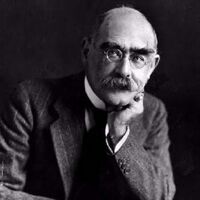Evarra and his Gods
READ here:
This is the story of Evarra—man—
Maker of Gods in lands beyond the sea.
Because the city gave him of her gold,
Because the caravans brought turquoises,
Because his life was sheltered by the King,
So that no man should maim him, none should steal,
Or break his rest with babble in the streets
When he was weary after toil, he made
An image of his God in gold and pearl,
With turquoise diadem and human eyes,
A wonder in the sunshine, known afar,
And worshipped by the King; but, drunk with pride,
Because the city bowed to him for God,
He wrote above the shrine: “Thus Gods are made,
“And whoso makes them otherwise shall die.”
And all the city praised him. . . . Then he died.
Read here the story of Evarra—man—
Maker of Gods in lands beyond the sea.
Because the city had no wealth to give,
Because the caravans were spoiled afar,
Because his life was threatened by the King,
So that all men despised him in the streets,
He hewed the living rock, with sweat and tears,
And reared a God against the morning—gold,
A terror in the sunshine, seen afar,
And worshipped by the King; but, drunk with pride,
Because the city fawned to bring him back,
He carved upon the plinth: “Thus Gods are made,
“And whoso makes them otherwise shall die.”
And all the people praised him. . . . Then he died.
Read here the story of Evarra—man—
Maker of Gods in lands beyond the sea.
Because he lived among a simple folk,
Because his village was between the hills,
Because he smeared his cheeks with blood of ewes,
He cut an idol from a fallen pine,
Smeared blood upon its cheeks, and wedged a shell
Above its brows for eyes, and gave it hair
Of trailing moss, and plaited straw for crown.
And all the village praised him for this craft,
And brought him butter, honey, milk, and curds.
Wherefore, because the shoutings drove him mad,
He scratched upon that log: “Thus Gods are made,
“And whoso makes them otherwise shall die.”
And all the people praised him. . . . Then he died.
Read here the story of Evarra—man—
Maker of Gods in lands beyond the sea.
Because his God decreed one clot of blood
Should swerve one hair’s—breadth from the pulse’s path,
And chafe his brain, Evarra mowed alone,
Rag—wrapped, among the cattle in the fields,
Counting his fingers, jesting with the trees,
And mocking at the mist, until his God
Drove him to labour. Out of dung and horns
Dropped in the mire he made a monstrous God,
Abhorrent, shapeless, crowned with plantain tufts,
And when the cattle lowed at twilight—time,
He dreamed it was the clamour of lost crowds,
And howled among the beasts: “Thus Gods are made,
“And whoso makes them otherwise shall die.”
Thereat the cattle bellowed. . . . Then he died.
Yet at the last he came to Paradise,
And found his own four Gods, and that he wrote;
And marvelled, being very near to God,
What oaf on earth had made his toil God’s law,
Then cried Evarra: “I have sinned!”—“Not so.
“If thou hadst written otherwise, thy Gods
“Had rested in the mountain and the mine,
“And I were poorer by four wondrous Gods,
“And thy more wondrous law, Evarra. Thine,
“Servant of shouting crowds and lowing kine.”
Thereat, with laughing mouth, but tear—wet eyes,
Evarra cast his Gods from Paradise.
This is the story of Evarra—man—
Maker of Gods in lands beyond the sea.

